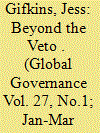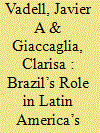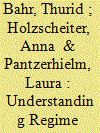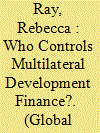|
|
|
Sort Order |
|
|
|
Items / Page
|
|
|
|
|
|
|
| Srl | Item |
| 1 |
ID:
184641


|
|
|
|
|
| Summary/Abstract |
The formal rules governing the UN Security Council offer little insight into how negotiations are conducted on a day-to-day basis. While it is generally assumed that permanent members dominate negotiations, this article investigates avenues for influence for elected members and the UN Secretariat. Institutional power is used to show how permanent members adopt dominant positions in negotiations extending far beyond their Charter-given privileges. Dominance of permanent members is moderated, however, by the legitimacy that support from elected members brings to a resolution. Similarly, the UN Secretariat can use its legitimated authority to influence decisions. The article argues that informal practices are key in understanding how power and influence are allocated in the Council and it forms a building block for future analyses of Security Council practices. This argument also has implications for the perennial reform debates and the prospects for informal reform.
|
|
|
|
|
|
|
|
|
|
|
|
|
|
|
|
| 2 |
ID:
184642


|
|
|
|
|
| Summary/Abstract |
At the beginning of the twenty-first century, Brazil became a crucial player as the principal advocate of South American integration. To Mercado Común del Sur (Mercosur) was added the Union of South American Nations (UNASUR), reaffirming regional policies around the idea of “South America.” Today, however, the withdrawal of Brazilian leadership along with the reversals and loss of focus in UNASUR and Mercosur have damaged the credibility of the region’s initiatives, as well as finding South America’s common voice. Despite this, this article argues that Brazil has not entirely disengaged from the region or abandoned the principle of regionalism. Recognition of Latin America’s distinctive history the authors to construct a model that incorporates complexity and disorder in which Brazil’s institutional political development will have significant repercussions for the future of the region.
|
|
|
|
|
|
|
|
|
|
|
|
|
|
|
|
| 3 |
ID:
184645


|
|
|
|
|
| Summary/Abstract |
The internationalization of medical services—including organ transplantations—is driven by advances in technology and integration of trade. Patients in need of organ transplants began to seek these services outside their countries of origin in the 1980s and 1990s, and this practice expanded in the ensuing decades. While these transplants yielded benefits to some, abuses included human trafficking, preying on vulnerable populations, and negative outcomes in health equity. This case study of efforts to regulate the international transplant trade yields important findings for our understanding of global health governance. First, it provides support to the “globalization reformers” who maintain that if globalization’s benefits are to be widely distributed, institutional mechanisms must be enacted. Second, it provides another example of the externalities that occur when health concerns are absent, poorly represented, or weakened in trade negotiations. Finally, it demonstrates limits of a global health regime that lacks a centralized authority.
|
|
|
|
|
|
|
|
|
|
|
|
|
|
|
|
| 4 |
ID:
184647


|
|
|
|
|
| Summary/Abstract |
A handful of companies dominate the world’s shipping industry. These firms have gained political leverage over the global governance of container shipping in particular. Intriguingly, in recent years the Danish conglomerate Maersk—the world’s biggest container and shipping vessel company since the mid-1990s—has been using its influence to push for higher environmental standards for the industry as a whole. To some extent these initiatives are helping to promote environmental efficiencies, cleaner fuels, and greener technology. But they are also raising costs for small and midsized companies with extremely low profit margins, further enhancing the competitiveness of the biggest shipping conglomerates in an increasingly oligopolistic market. While voluntary self-governance by companies such as Maersk is incrementally improving the environmental management of global shipping, it is also further concentrating governance power within a few transnational corporations, potentially taking more ambitious regulation off the agenda.
|
|
|
|
|
|
|
|
|
|
|
|
|
|
|
|
| 5 |
ID:
184643


|
|
|
|
|
| Summary/Abstract |
When international organizations take measures that seem to go against the national interests of a Member State, is withdrawal inevitable? What do past cases reveal about how the extreme decision of withdrawal has been contained? This article examines the case of Brazil and the Inter-American Commission on Human Rights, which is part of the Organization of American States (OAS). Having received a harsh decision by the Commission, Brazil first threatened to leave OAS, but later mobilized diplomatic strategies to reform its Commission. What happened between a first reaction that considered withdrawal and the final decision to work to reform the system? The article advances the argument that containing international organization withdrawal benefits from the convergence and mutual reinforcement provided by internationally engaged institutions, bureaucrats committed to multilateralism, and a democratic leadership. The case helps to recognize the relevant intrastate variables that play out in the decision-making process that may eventually lead to withdrawal.
|
|
|
|
|
|
|
|
|
|
|
|
|
|
|
|
| 6 |
ID:
184644


|
|
|
|
|
| Summary/Abstract |
How do regime complexes as social orders affect relations among international organizations (IO s)? This article explores this question by studying the longitudinal development of interorganizational practices and the social meanings attached to these practices that constitute a regime complex. Adopting a practice lens, our analysis redirects scholarly attention from rationalist accounts of strategic interactions between IO s to the study of patterned “doings” among actors in regime complexes. The mixed-methods analysis of interorganizational practices between eight IO s in the global health regime complex shows that cooperation among IO s is not primarily the outcome of rational responses to problems of collective action. Rather, IO s engage in similar types of practices because they want to be considered “good” IO s that follow a repertoire of habitual and appropriate practices. In turn, interorganizational practices create social meanings that constrain IO s. The approach put forward in this paper demonstrates the ordering effect of practices on the global health regime complex.
|
|
|
|
|
|
|
|
|
|
|
|
|
|
|
|
| 7 |
ID:
184646


|
|
|
|
|
| Summary/Abstract |
Multilateral development banks (MDB s) are a growing source of development finance, with nearly two trillion dollars in assets. They have developed a wide array of governance structures, with implications for the distribution of members’ control over those assets. This paper measures that power distribution in 28 MDB s using Penrose-Banzhaf and Shapley-Shubik power indices and members’ relative voting power on MDB governance boards. It uses these calculations to create a typology of MDB governance structures: creditor-led MDB s distribute power among non-borrowers, core borrower-led MDB s distribute power among a few central borrowers, and mutual aid-oriented MDB s distribute power among a wide group of borrowers. Finally, it explores the impact of the creation of two new MDB s, the Asian Infrastructure Investment Bank and the New Development Bank, and finds that while they do not dramatically alter the global landscape they do allow significantly greater access to capital for some borrowers.
|
|
|
|
|
|
|
|
|
|
|
|
|
|
|
|
|
|
|
|
|